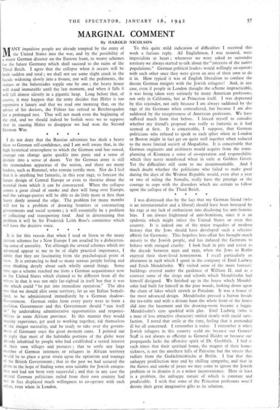To this quite mild indication of difficulties I received this
week a furious reply. All Englishmen, I was assured, were imperialists at heart ; whenever we were asked to surrender territory we always started to talk about the "interests of the native populations." German political leaders would willingly co-operate with each other once they were given an area of their own to do it in. How typical it was of English liberalism to confuse the decent German emigres with the Jewish refugees! And, in any case, even if people in London thought the seheme impracticable, it was being taken very seriously by many American professors, not only in California, but at Princeton itself. I was depressed by this rejoinder, not only because I am always saddened by the rage of the Germans when contradicted, but because I am also saddened by the receptiveness of American professors. We have suffered much from that before. I forced myself to consider whether my friend's proposal was really as fantastic as it had seemed at first. It is conceivable, I suppose, that German politicians who refused to speak to each gther when in London or Boston might in fact get on quite well together when reduced to the more limited societY of Mogadishu. It is conceivable that German engineers and architects would acquire from the town- planning of Kismayu a sense of co-operation and responsibility which they never manifested when in exile at Golders Green. Yet the difficulties still seem to me insurmountable. And I much doubt whether the politicians who failed to make good during the days of the Weimar Republic would, even after a year or two of ruling the Somalis, really have the prestige or the courage to cope with the disorders which are certain to follow upon the collapse of the Third Reich.


























 Previous page
Previous page